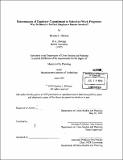Determinants of employer commitment to school-to-work programs : why do Boston's ProTech employers remain involved?
Author(s)
Hillman, Heather L. (Heather Lorraine), 1970-
DownloadFull printable version (7.497Mb)
Other Contributors
Massachusetts Institute of Technology. Dept. of Urban Studies and Planning.
Advisor
Aixa Cintron.
Terms of use
Metadata
Show full item recordAbstract
Work-based School-to-Work programs are being asked to help solve faltering labor market prospects for youth, national educational reform needs and decreasing U.S. economic competitiveness. In 1994, the Congress enacted the School-to-Work Opportunities Act to appropriate more than $2 billion over seven years to lay the grounds for a national School-to-Work framework. While many studies have concerned themselves with the School-to-Work outcomes for youth, fewer have addressed sustainable incentives for employers to remain involved. Such incentives are critical if work-based School-to-Work is to survive at a large scale. This case study highlights which factors have kept the healthcare and financial services employers involved in Boston's ProTech program, and the prospects for expanding a program like ProTech to reach more students. Primary reasons for involvement include: (1) an altruistic commitment to benefit the community and (2) long-term labor force development (including regional labor pool expansion, hiring networks and industry advertisement). Trainee recruitment to the employers' permanent staff is not playing a large role. Important factors in maintaining employer commitment are the high personal rewards to those who work with the youth and the responsiveness of the coordinating entity, the Boston Private Industry Council, to employers' needs. Unfortunately, however, ProTech could not be offered in its current form to all students. Primary constraints to expansion include: (1) the need for supervisors to be interested in and capable of working with youth, (2) employers' need to select students, and (3) employer budgetary limitations. The results of this study highlight the improbability that the ProTech program in its current form could be offered to students on a large scale. However, a simpler, modified version of the program may be able to effectively reach large numbers of students.
Description
Thesis (M.C.P.)--Massachusetts Institute of Technology, Dept. of Urban Studies and Planning, 1999. Includes bibliographical references (p. 108-109).
Date issued
1999Department
Massachusetts Institute of Technology. Department of Urban Studies and PlanningPublisher
Massachusetts Institute of Technology
Keywords
Urban Studies and Planning.